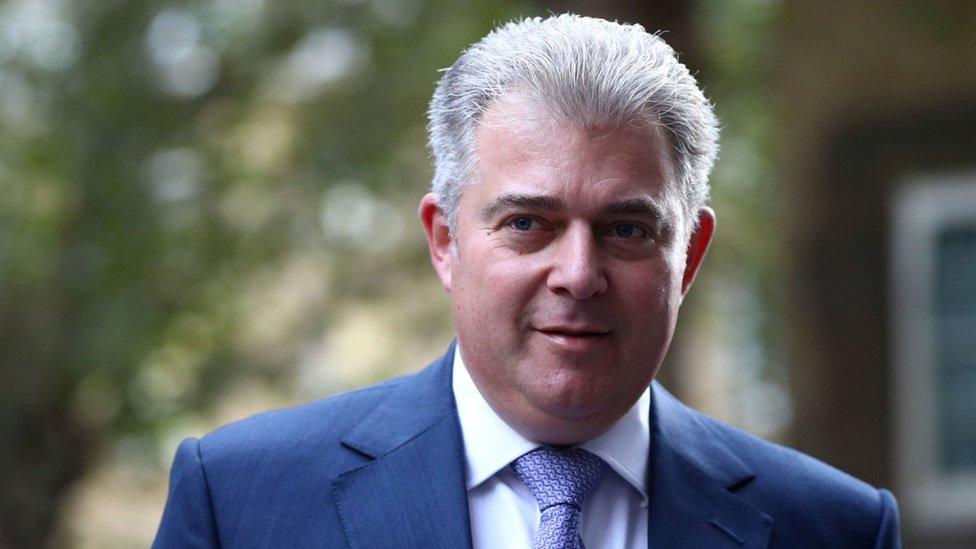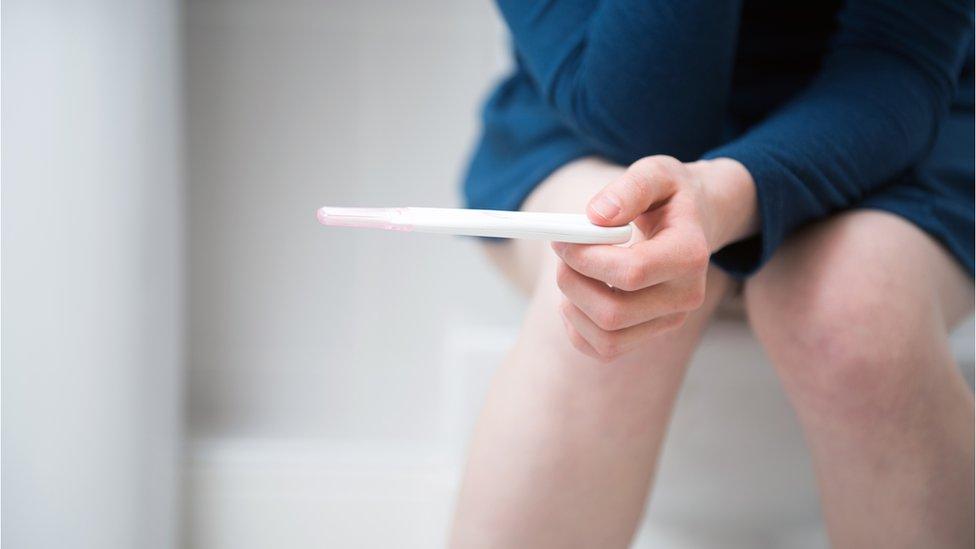Abortion: DUP criticises Westminster intervention
- Published

Sir Jeffrey Donaldson says the move will be a "very serious breach of the devolution settlement"
A move by the UK government to compel Stormont to implement abortion laws will have "serious consequences for devolution", a DUP MP has said.
Sir Jeffrey Donaldson said it would be a "very serious breach of the devolution settlement".
Westminster is planning to give Northern Ireland Secretary Brandon Lewis new powers to take such action.
Northern Ireland's abortion laws changed last March after Westminster acted during the absence of devolution.
Speaking on BBC NI's Good Morning Ulster programme, the DUP leader in the House of Commons, Sir Jeffrey Donaldson said the action should be a concern even for those who support the provision of abortion services.
He said people "should recognise the danger of what the secretary of state is doing here" and "if he can do it on this, then it could happen on many other areas".
BBC News NI understands that Northern Ireland's attorney general advised the Stormont executive that commissioning abortion services could be regarded as a controversial matter under the terms of the ministerial code.
The code, external states issues which are "significant or controversial" must be brought to the executive.
Some Stormont parties had been calling on Health Minister Robin Swann to commission the services.
But he has maintained that it requires the support of the whole executive.
It is believed Attorney General Brenda King gave the advice to Communities Minister Deirdre Hargey, who asked her whether Mr Swann was required to get approval of the executive before setting up abortion services through the Department of Health.
It is understood Ms King's view was that if Mr Swann acted without consensus of the full executive, there was a risk of a legal challenge.
A statement issued earlier by the Department of Health reflected this, and stated that Mr Swann's position was that the issue of abortion services was controversial and required the support of the whole executive.
"He does not believe that a ministerial decision to commission and fund abortion services would be defensible in court in the absence of executive approval," it added.
Commissioning of services stalled
While the law was passed last March, commissioning of full services has been stalled due to differences within the five-party executive.
This latest development, first reported by the Guardian, external, will see the NI secretary lay new regulations in Parliament early next week.
The move will let him direct Northern Ireland's Department of Health to commission the services.
Stormont and Westminster are also facing legal action from the Human Rights Commission over the delay.
The law changes meant abortion laws in Northern Ireland altered significantly last year, with terminations available in all circumstances of the first 12 weeks of pregnancy.
It is legal in other circumstances up to 24 weeks and beyond that for cases of non-fatal fetal disabilities and fatal fetal abnormalities.

NI Secretary Brandon Lewis will lay new regulations in Parliament early next week
Alliance Party assembly member (MLA) Paula Bradshaw said the responsibility for providing abortion services lay with the health minister.
She said he had the power, responsibility and legal duty to provide a "comprehensive framework for our healthcare professionals to operate within".
Ms Bradshaw said while she believed in devolution, she welcomed the intervention of the NI secretary.
Agriculture Minister Edwin Poots, of the DUP, wrote on social media the UK government "would do well to listen to first minister on this issue" and that there was anger among assembly members at "this act of destruction on the devolution settlement".
Allow X content?
This article contains content provided by X. We ask for your permission before anything is loaded, as they may be using cookies and other technologies. You may want to read X’s cookie policy, external and privacy policy, external before accepting. To view this content choose ‘accept and continue’.

The Ulster Unionist Party (UUP) leader, Steve Aiken, said the "controversial" issue of abortion should be dealt with by the whole executive.
"Any unilateral decision by the health minister to commission and fund new abortion services without executive approval would be a breach of the Northern Ireland Act and the Ministerial Code," he said.
He added that it was "deeply regrettable that some political parties are seeking to score points on such a sensitive issue".
SDLP leader Colum Eastwood said it was a "matter of regret" the executive had not been able to "commission services in line with its legal obligations".
"The SDLP has been warning for weeks that this British government has shown no restraint when it comes to interfering with the devolution settlement," he said.
Ms Hargey said it was "unfortunate and unnecessary" that the action was not able to be taken locally.
The Sinn Féin MLA said the "executive as a whole, and certainly those parties who are blocking the commissioning of these services, need to be implementing them as soon as possible".
She said she had unsuccessfully tried to have the issue placed on the agenda for the executive last week, and would try again for next week.
The Church of Ireland said the move was "unjustified" now Stormont was sitting again.
Archbishop of Armagh John McDowell said it was "clearly a devolved matter".
The Presbyterian Church said it would "seriously undermine" devolution and called on Mr Lewis to withdraw the proposal.
New legislation
At present health trusts are carrying out interim services for early medical abortions up to 10 weeks, meaning women seeking a termination beyond that are required to travel to England.
The DUP, which opposed the changes to the abortion laws by Westminster, has proposed a piece of legislation at Stormont seeking to restrict abortions in cases of non-fatal disabilities.
It passed its second reading on Monday with the support of a number of parties.
Sinn Féin abstained on that vote but has separately called for the Department of Health to commission full abortion services as required under the regulations.
The Alliance Party, the SDLP and the Ulster Unionists view the issue as a matter of conscience for individual assembly members.
Related topics
- Published15 March 2021

- Published16 February 2021

- Published31 March 2020

- Published8 June 2022
